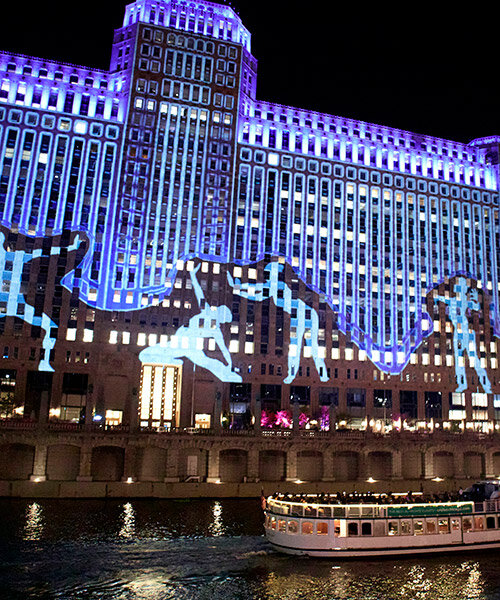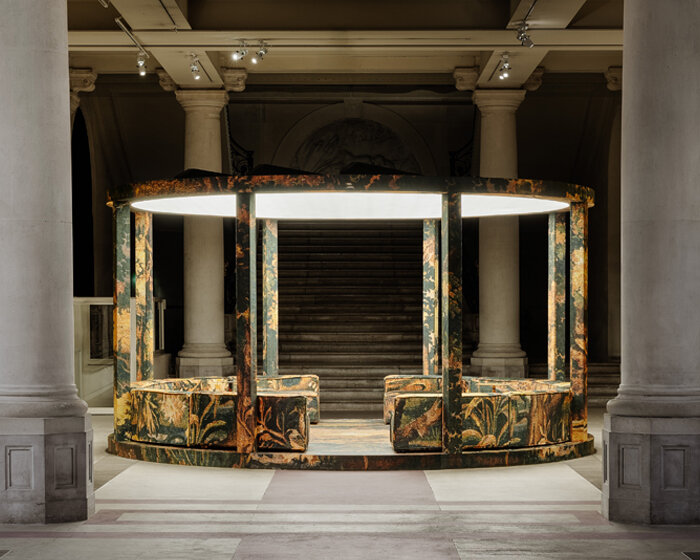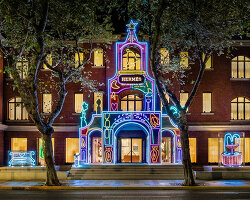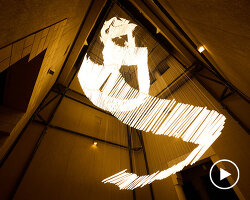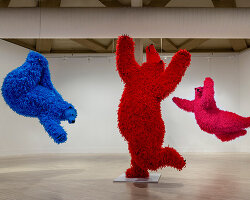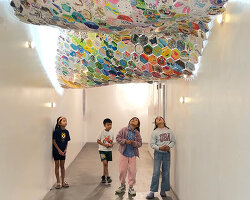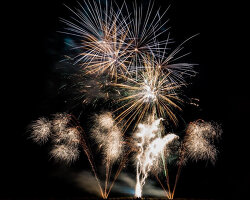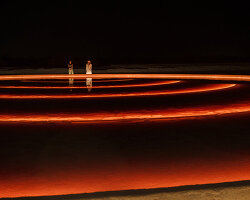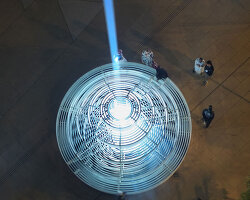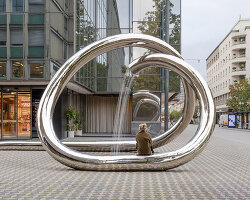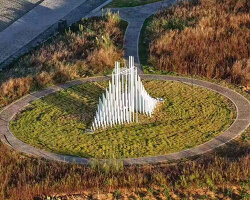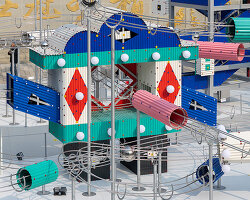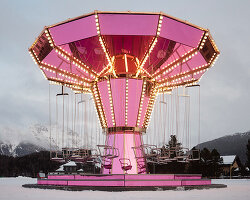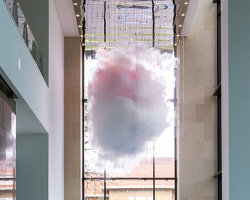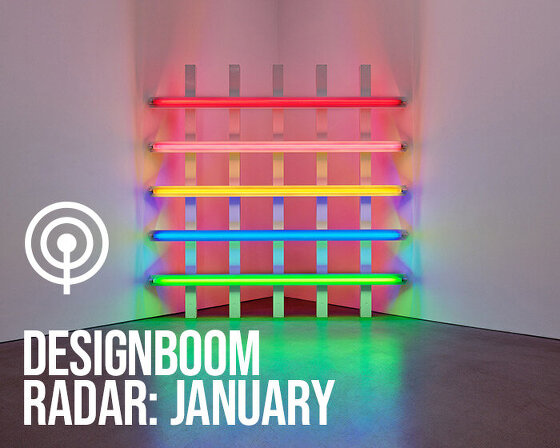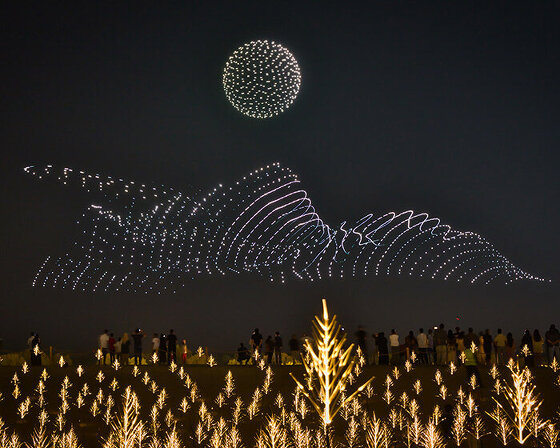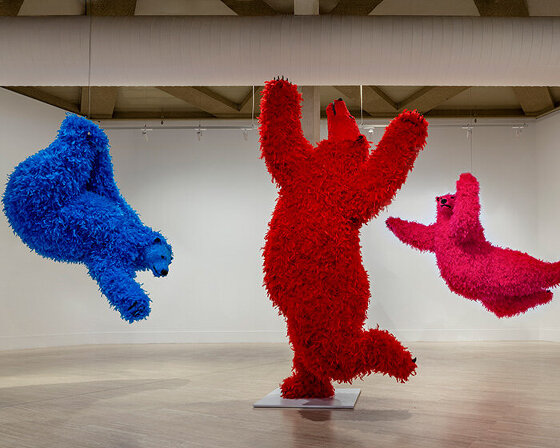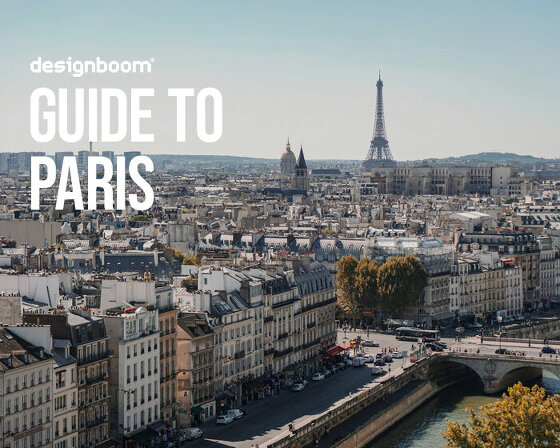dance and architecture unite with luminous projections
Artist Brendan Fernandes celebrates the opening of Build Up The House at THE MART in Chicago, a luminous public artwork at the intersection of dance, architecture, and cultural heritage. With this piece, Fernandes has transformed the iconic facade of THE MART into an animated canvas of movement, sound, and symbolism to commemorate the 40th anniversary of house music — a genre deeply rooted in Chicago’s rich, diverse history. ‘Build up the House reimagines the idea of a physical building as an institution, and how we think about reimagining monuments, buildings, and institutions,’ Fernandes explains in an interview with designboom. The installation invites viewers to both observe and engage, bridging architecture, performance, and light art in a communal celebration of music and identity.
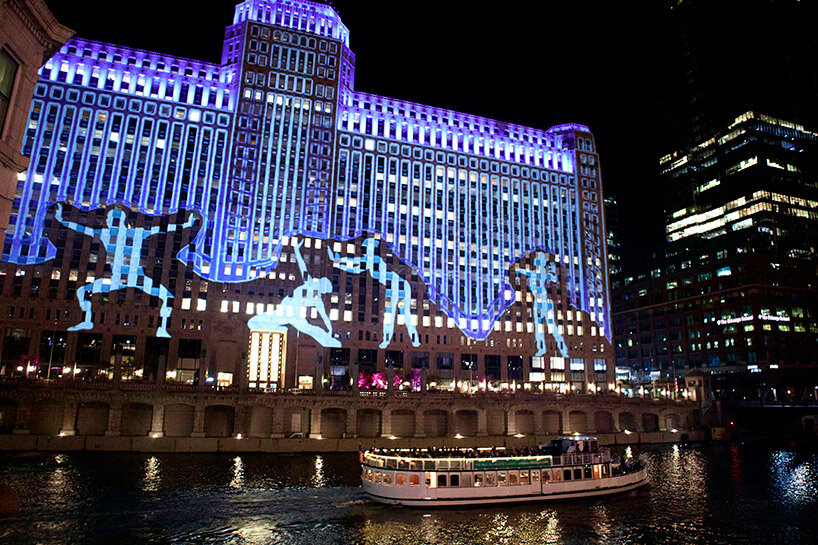
images © Matt Bruinooge
brendan fernandes celebrates house music in chicago
Drawing on his own Kenyan Indian heritage, artist Brendan Fernandes weaves African textiles and natural motifs into the projected scenes across the facade of THE MART, celebrating the African diaspora’s significant contributions to global culture. His work reflects themes that have long characterized his practice: identity, race, and the movement of peoples. ‘There are a lot of textiles referencing from West African wax cloths to Kenyan Kitenge cloths,’ he notes, emphasizing their symbolic role in the narrative. ‘It also references a moment of change, finding a newness…a way of decolonizing is to return to nature.’ The visual motifs blend with the beats and rhythm of house music, creating a unified display of dance, heritage, and urban renewal.
The choreographic process behind Build Up The House was as intricate as the final display, requiring inventive approaches to scale and motion. Fernandes collaborated with two dancers, choreographing movements that captured both ballet’s discipline and the fluidity of Vogue — a nod to the influence of queer and POC communities in dance culture. ‘Even just thinking about magnifying or shrinking certain bodies, playing with the technology to create rhythm and cadence in tandem with the beat,’ Fernandes shared, underscoring the meticulous synchronization between movement and the monumental backdrop. The result is a dynamic, eight-minute sequence that pulses with life, inviting onlookers to pause, celebrate, and, as Fernandes hopes, join in the dance. Read the full interview below!
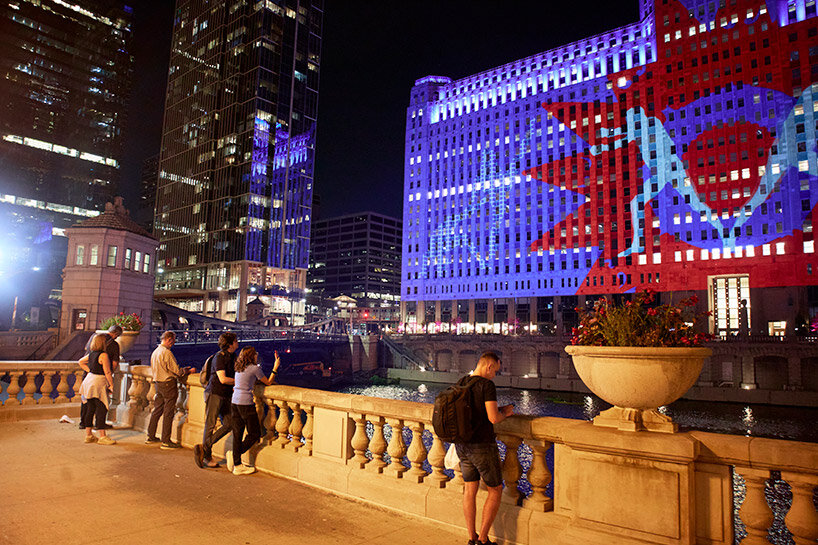
dialogue with the artist
designboom (DB): Build Up the House reimagines THE MART’s facade with animated dancers, ‘new’ windows, and vibrant, African-inspired backdrops. What inspired you to blend architectural and cultural elements into this piece, and how do these elements reflect your vision for the space?
Brendan Fernandes (BF): Build up the House reimagines the idea of a physical building as an institution, and how we think about reimagining monuments, buildings and institutions. The idea was to project doorways and windows to be new access points, new ways to see outwardly through a window or a doorway as a new access point. That was the beginnings of a new way to see the the facade, while blending in the cultural aspects. House music comes from black influences in the community, and also from Afro centric beats. For me, being a Kenyan Indian, I was thinking a lot about those patterns to become something that’s vibrant and joyful, and also something that creates an idea of a garden. How do we think about going back to landscape? How to go back to the garden, to nature as a new beginning?
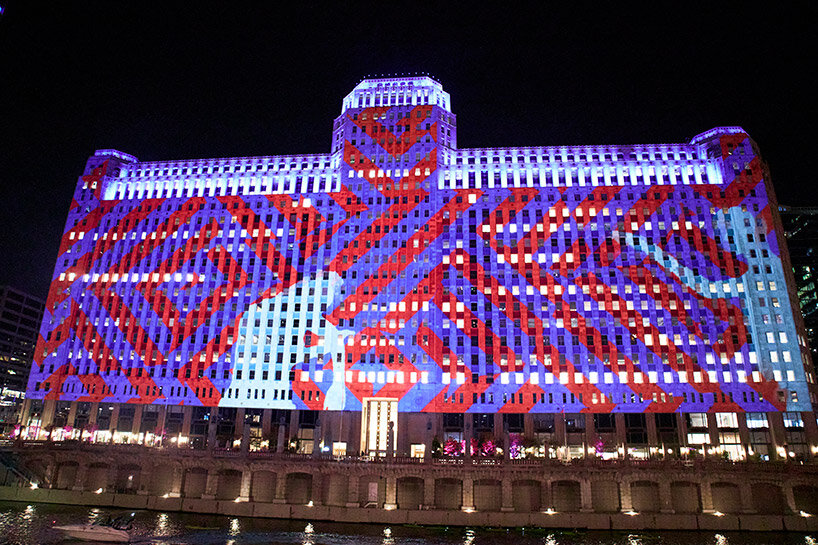
DB: Can you discuss how you made some choices about the specific dancers or movements that are actually the components of the piece?
BF: Initially I thought I would just use stock dancers, because we can’t use photographic realness on the facade. I realized that it needed to be more graphic. So I started using stock imagery, but it was not working. I needed to choreograph something. So I took two dancers that I’ve worked with many times, Katlin Bourgeois and Leanne Sherry, to come into a green screen space and I choreographed specific movements for them. I also brought in a lot of Vogue sensibility.
There is a cameo by myself where my hands are moving — I was just teaching them. But the camera people started recording me, and then put me into the actual piece in one of the edits. I thought: Oh, okay, I didn’t want to be in it! But I was in the end. For me, it was about working with a ballet technique and a club technique of Vogue. It was about choreographing, having a specific sense of timing, and thinking about the size of the body to the building. I thought about how I can create that or multiply them. There was actually only two dancers in the entire filming process, but in the video editing process, I could mirror them or create multiple bodies. So it looks like there’s a core of bodies, a critical mass of dancers, but there was only two in the studio.
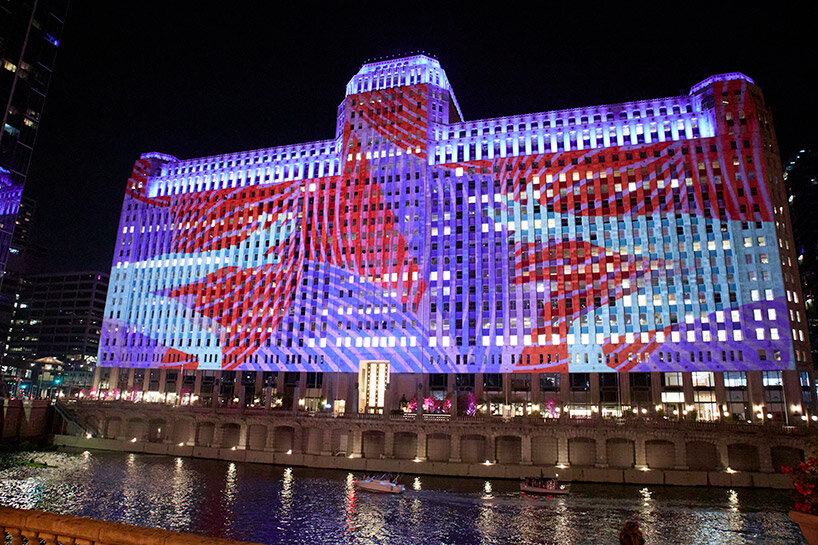
DB: It’s such a technological feat, can elaborate on the technical aspects of putting this piece together?
BF: I’ve seen many Art on the Mart shows. I studied the building, saw different projects. I started to make choices about what works and doesn’t work. I had the opportunity to also make short clips to test. There were so many testings, I realized, for instance, that red doesn’t work well on the building, and that I’m working with a grid of windows that are sometimes lit. It’s a public piece. There are sirens and lights all over the city, and there’s a sound component as well. That was one of the technical challenges — understanding what this could be from doing many testings.
At first I wanted it to be a thirty-minute piece. Ultimately it took a long time to animate, so in the end, the piece is eight minutes and it is repeated four times. Even just learning how to to animate, how to work with the team at Daily Planet — it was a beautiful collaboration. Also, just learning to render a file. It takes a long time. Getting the projection mapping to fit onto the the building perfectly. There’s a part of the animation where all these lines come up and match perfectly with all the windows. Just getting those those specifics details was really important and challenging.
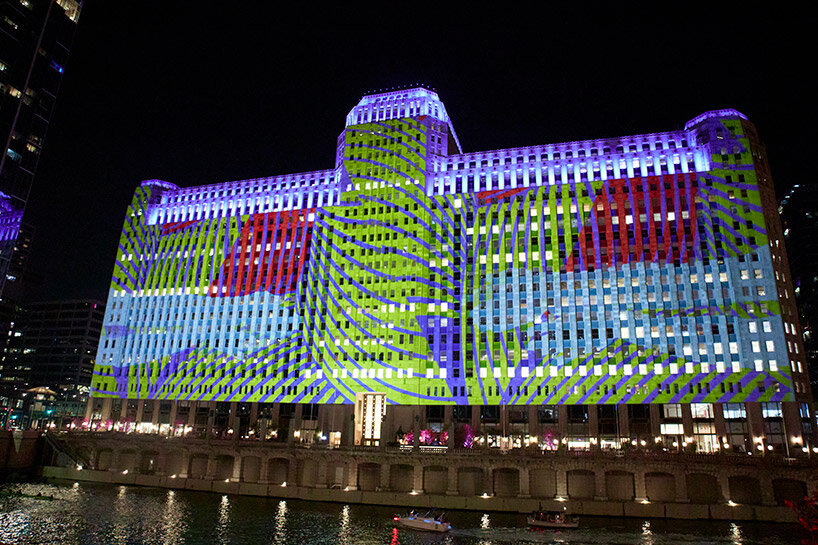
DB: How long was the process of putting this together?
BF: It was about a year in total. From early storyboarding and hand-drawing each frame, to developing ideas, visions, and a mood board. Then I started to create small clips with Daily Planet. We went back and forth between what we liked and disliked. Then we came to the conclusion, and we needed to actually record the dancer. We hired the two dancers, as I mentioned, from the Joffrey — Katlin Bourgeois runs the Contemporary Ballet Academy program at the Joffrey and Leanne used to teach there. Together we worked with the tests secretly, late at night. Watching something on an LED screen is totally different than a projection on a building with all of these windows. At one point I had chosen black backgrounds. But the projected black backgrounds just read as the building itself. So we changed all of those to white backgrounds, thinking about the colors of the textiles, altering the work to what works best on the building as it’s projected.
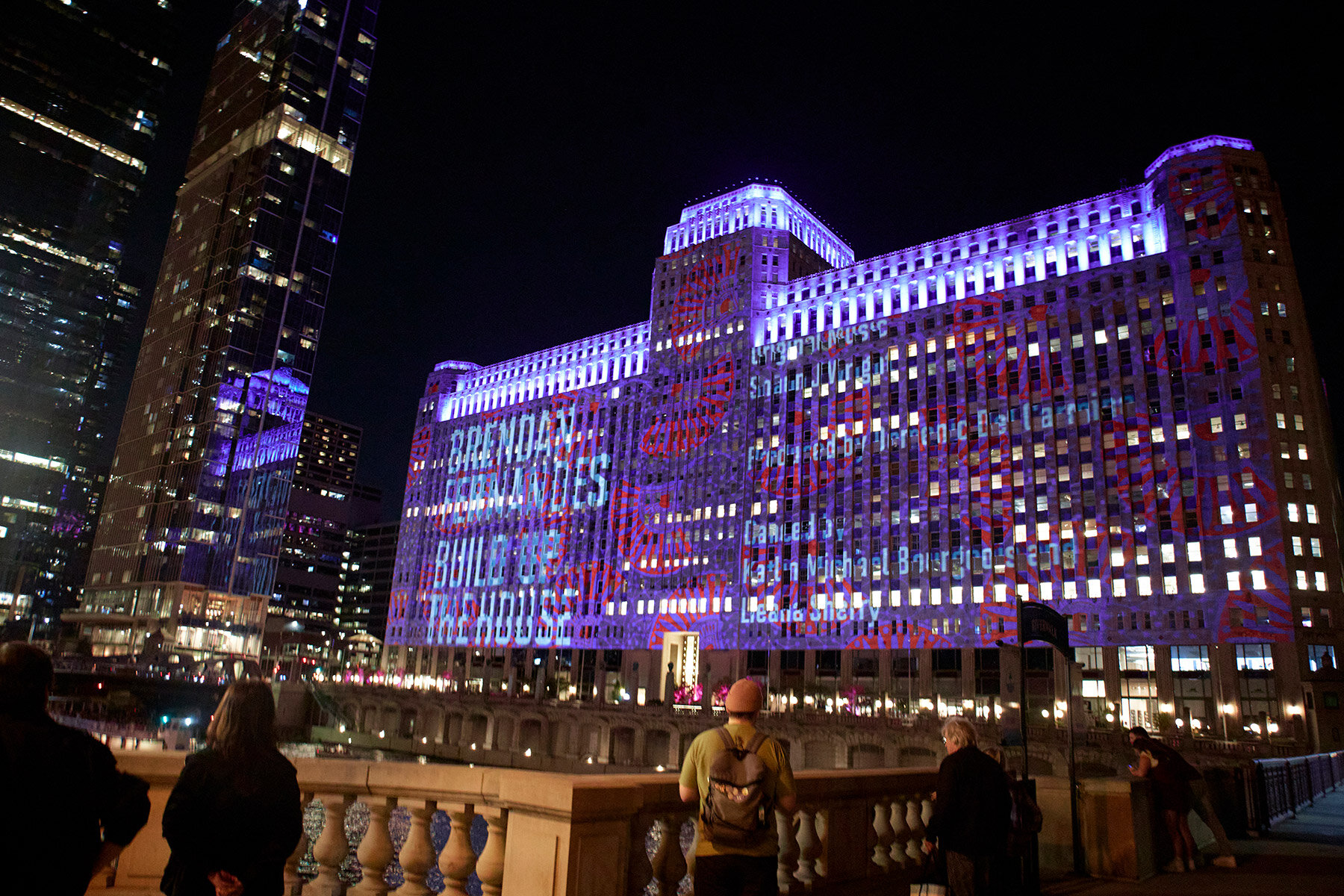
DB: This work is an homage to house music. Chicago is the city that made house music, and the project marks its 40th anniversary. Can you talk about that anniversary, how that wove into your thinking, and how the piece is meant to honor that legacy?
BF: Build up the House is an homage to the 40th anniversary of house Music and the birthplace of it in Chicago. I come from a technical ballet and modern dance background. But outside of that, my community is built around going to the club and dancing in critical mass in forms of joy — finding people that are like-minded. The queer club scene is also a part of a POC community, one that supports ideas of diversity. That is what house music is to me. Also positing the influence of Afro beats and African music and culture.
What’s really important is to create this piece as homage to house music and to Chicago, because it’s a city that I call home. It’s also important that at each night, this becomes a dance party, kind of like an impromptu moment for people to stop and dance. I’ll go many nights to just sit and watch, and when I see people start dancing, it really makes me excited because that was the point! It should be a place for stopping and reconsidering, but it should also be a little moment to just dance. For me, dancing is a political space of protest, but also as one to find joy and freedom. If you just stop and move and feel it, it’s this giving of a space that becomes something different. So the Riverwalk is like a trajectory of action, but I want you to dance and move with it and with each other.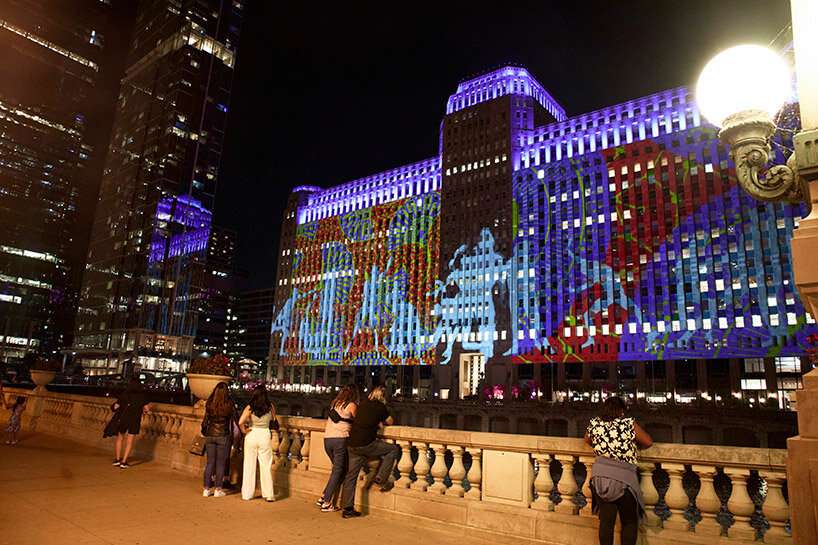
DB: How did you make the musical selection? How did you settle on this particular soundtrack, and how does it work together with the imagery as well?
BF: The soundtrack is a brand new commission and a collaboration with House DJ Shaun J. Wright, who’s based in Chicago. He’s a legend in his own right. I gave Shaun a lot of background behind what this piece is about and I told him about the use of Afro beats towards the end. So Shaun came up with a sound. Again, we went back and forth until it made sense and worked with the animation, but we also made the sound, and animated to the sound, making the movement gestures.
When we were in the studio, the dancers were dancing to the sound, and we took those moments and edited them into the piece. I wrote the lyrics to the sound and Shaun and I sang them back and forth to each other in a House style. That’s another unexpected little cameo of me in the piece. I thought Shaun would sing it alone, but it became another collaboration. I really love how this whole piece is about community and gathering and bringing people together — both when it’s projected, but also the making of it. It was a deep collaboration between dancers, editors, producers and musicians, it was a really beautiful synergy that made this whole thing.
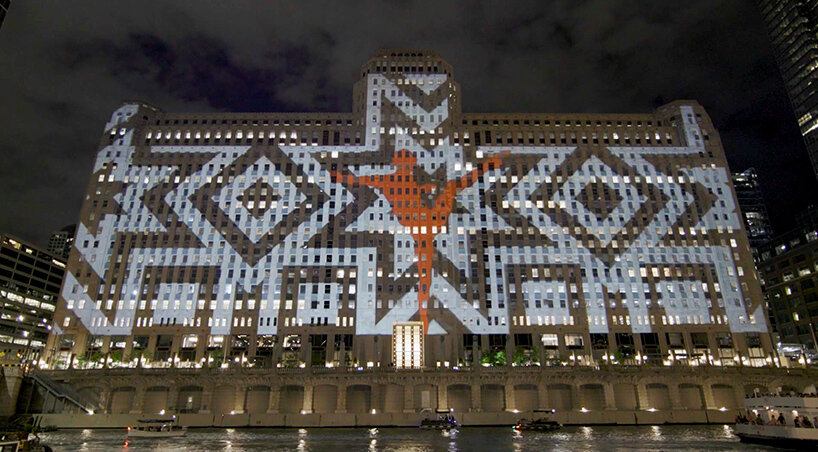
DB: As a whole, your practice looks at themes of identity, race, and migration. How do these themes, which are points of continuity in your practice, manifest in this particular commission or piece?
BF: The ideas of race, migration, movement, for me, come from something that I’m always thinking about. It’s a lived experience for me. But in Build up the House, it’s through the lens of a House community, a queer community, and a POC community. I’m thinking about it as extensions through dance, like ‘let’s move forward.’ Let’s imagine a new beginning. Let’s think about how we can make change for ourselves to live better futures, better lives? The idea of Build up the House is like building up the House beat, continuing the pulse of of the beat of the music, but also this idea of moving forward. It’s more about an exploration of identity. Not specifically a cultural identity, but a subcultural identity where we are supporting, nurturing, and caring for a community so we can be a better society and take care of each other.
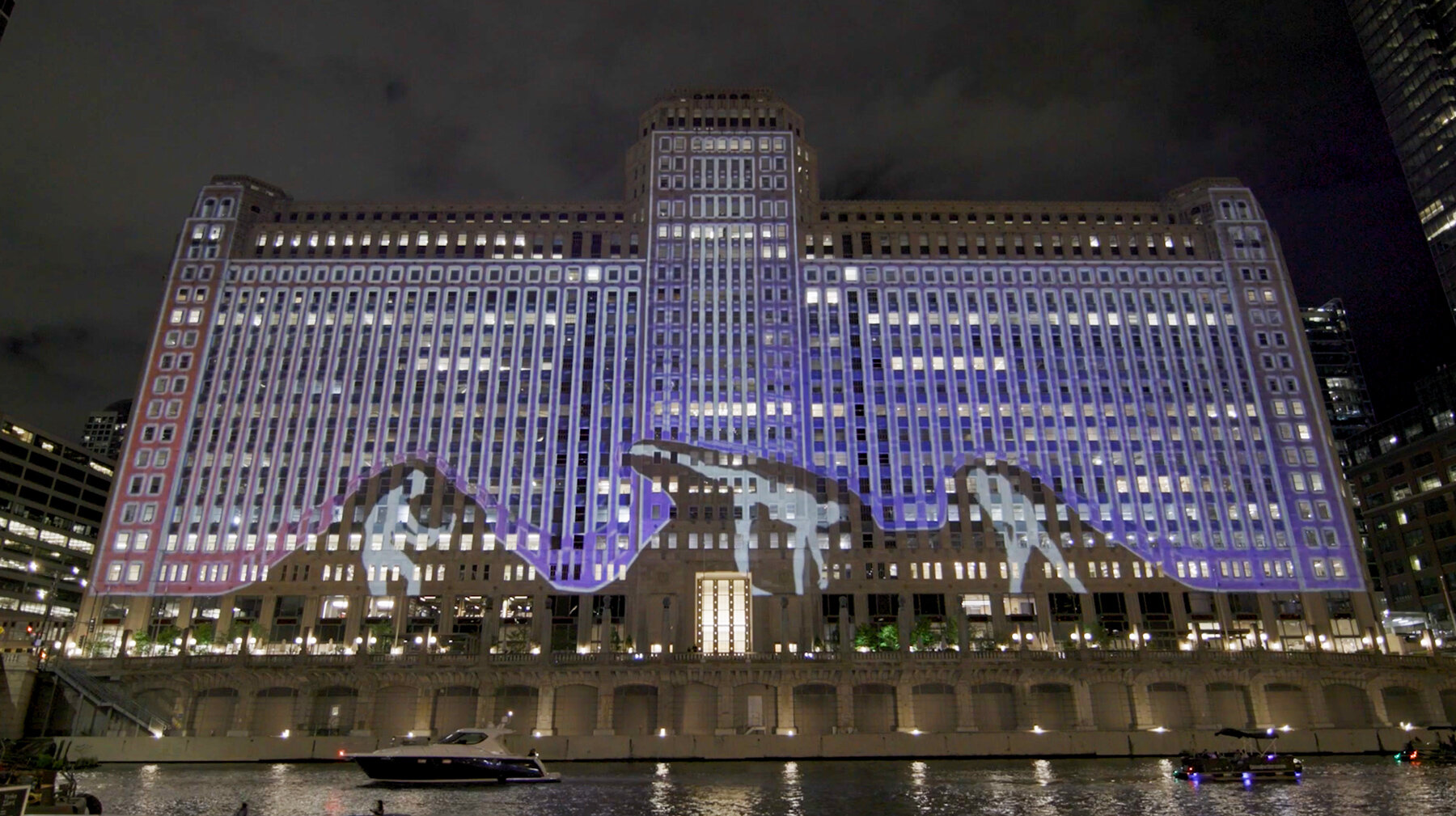
DB: You incorporate elements like foliage and textiles that are representative of the African diaspora. Can you explain more about the symbolism of these visual motifs?
BF: In the piece, there are a lot of textiles referencing from West African wax cloths to Kenyan, you know, Kitenge cloths. It references my cultural identity as being a Kenyan Indian, but also this idea of returning back to the land, returning back to nature, specifically with the motifs of leaves and flowers. It also references a moment of change, finding a newness, where we might have to rebuild from the bottom down — going back to nature to plant those seeds and start growing again. A way of decolonizing is to return to nature. We have all derived from the continent of Africa. I wanted to go back to that idea of Africa as the motherland, Africa as the place to rebuild, rethink, and imagine new futures.
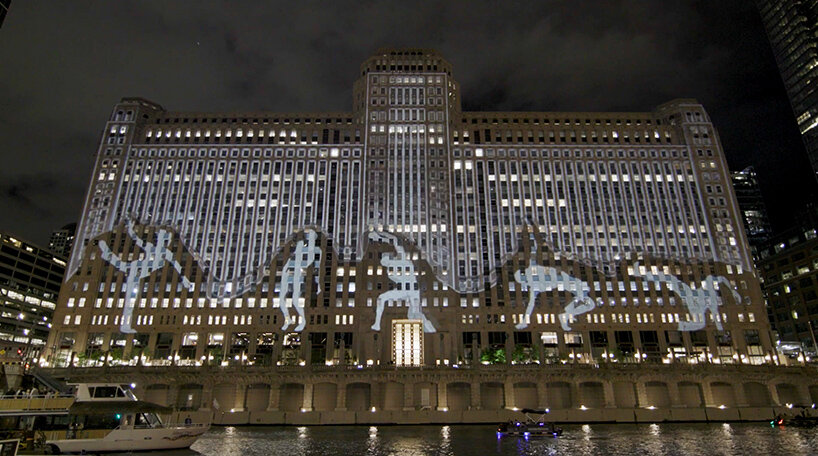
DB: This is probably the largest scale you’ve ever worked at. You said you only worked with two dancers, but how did you approach the choreography differently, knowing that this isn’t going to be on a human scale, but on a monumental scale. How did that shift inform your thinking while you were creating the work?
BF: It was interesting to think about the monumental scale of the art of the Merchandise Mart, and how people would visualize it. I was already imagining it on the building, even when I was working with the dancers in the studio, knowing that it would never be seen as a live performance. The process involved a lot of hoping and imagining what it could look like, and then seeing these tests and playing back and forth. Even just thinking about magnifying or shrinking certain bodies, playing with the technology to create rhythm and cadence in tandem with the beat. The beats became something that was really important. I was also thinking about flashes, pulses, and Morse code, and how those would translate with silhouettes. I was playing with pulses and rhythms to create textures and the feeling of a pulse.
project info:
name: Build up the House
artist: Brendan Fernandes | @brendanfernandes
location: THE MART, Chicago
program: Art on the Mart
on view: September 12th — November 20th, 2024
animation, post-production: Daily Planet
original music: in collaboration with Shaun J. Wright
producer: Domenic Del Carmine
dancers: Katlin Michael Bourgeois, Lieana Sherry
photography: © Matt Bruinooge
This new commission is made possible through the generous support of Cari and Michael Sacks, Anne Kaplan, and the Alumnae Board of Northwestern University.
happening now! thomas haarmann expands the curatio space at maison&objet 2026, presenting a unique showcase of collectible design.
